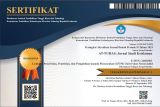Al-Qur’an Al-Karim.
Ad-Dusari, Muslim bin Muhammad bin Majid. (1423 H). Al-Mumthi’ Fil Qawaid Al-Fiqhiyyah, Riyadh, Maktabkah Malik Fahad.
Al-Bahuti, Mansur bin Yunus bin Idris. (1993). Syarhu Muntaha Al-iradat, Beirut: A’lamul Kutub.
Al-Haitami, Ahmad bin Muhammad bin Ali bin Ibnu Hajar. (1983). Tuhfatul Muhtaj fi Syarhi Al-Minhaj, Beirut: Dar Turots Ihya Al-Arabi.
Al-Khalil, Ahmad bin Muhammad bin Hasan bin Ibrahim. (2017). Syarhu Zadul Mustaqni’, Cairo, Mauqi Rosmi Syaikh Ahmad Al-Khalil.
Al-Mansur, Shalih bin Abdul Aziz. (1427 H). Az-Zawaj Bi Niyyati Thalaq Min Khilali Adilati Al-Kitab Wa Sunnah Wa Maqasidu Syariah, Riyadh: Dar Ibnu Jauzi.
Al-Musyaiqih, Khalid bin Ali. (1444 H). Khulasah Fil Qawaid Al-fiqhiyyah, Qasim: Rakaiz Li Nasyr Wa Tauzi.
Al-Muwafaq, Muhammad bin Yusuf. (1994). At-Taj wal Iklil Li Mukhtasar Khalil, Beirut: Darul Kutub Alamiyyah.
Al-Qurthubi, Muhammad bin Ahmad Al-Anshari. (1964). Al-Jami’ Li Ahkamil Qur’an, Cairo: Darul Kutub Misriyyah.
An-Namlah, Abdul Karim bin Muhammad. (1999). Al-Mazhab fi Ilmi Ushul Al-Fiqh, Riyadh: Maktabah Ibnu Rusyd.
An-Nasa’i, Abu Abdirrahman. (1930). Sunan Nasa’i, Cairo: Maktabah Tijariyyah Kubro.
As-sarakhsi, Muhammad bin Ahmad bin Abi Sahl, Al-Mabsuth, Beirut: Darul Ma’rifah.
As-Suyuthi, Jalaluddin Abdurrahman. (1983). Al-Asybah Wannazair Lis Suyuthi, Beirut: Darul Kutub Alamiyyah.
At-thabari, Muhammad bin Jarir, Jami’ul Bayan ‘An Takwil Ayyil Qur’an, Makkah, Dar At-tarbiyah wa at-turots.
At-Tirmidzi, Muhammad bin Isa. (1996). Sunan At-Tirmidzi, Beirut: Dar Al-Gharb Al-Islami.
Azizah, Alda Ismi, (2022) “Konsep Childfree Perspektif Pendidikan Keluarga dalam Islam”, Master Thesis. Ponorogo: Institut Agama Islam Ponorogo.
Az-Zamal. Abdul Muhsin bin Abdillah. (2001). Syarah Al-Qawaid As-Sa’diyyah, Riyadh: Dar Atlas Al-hadara.
Az-Zuhaili, Muhammad Musthafa. (2006). Qawaid Fiqhiyyah Wa Tatbiqatuha Fil Mazhab Al-Arba’ah, Damaskus, Dar Al-Fikr.
Az-Zuhaili, Wahbah bin Musthafa, Al-Fiqh Al-Islami Wa Adilatuhu, Damaskus, Darul Fikar.
Bukhari, Muhammad bin Ismail. (1993). Shahih Al-Bukhari, Damaskus: Dar Ibnu Kasir.
Iskandar. (2008). Metodelogi Penelitian Pendidikan dan Sosial Kuantitatif dan Kualitatif, Jakarta: GP Press.
Jonaedi Efendi dan Johnny Ibrahim. (2021). Metode Penelitian Hukum, Jakarta: Kencana.
Lexy J. Moleong. (2015). Metodologi Penelitian Kualitatif Edisi Revisi, Bandung: PT. Remaja Rosdakarya.
Nana, Syaodih Sukmadinata. (2006). Landasan Psikologi Proses Pendidikan, Bandung: PT. Remaja Rosdakarya.
Suharsismi Arikunto. (2006). Procedur Penelitian Suatu Pendekatan Praktek, Jakarta: Rineka Cipta.
Rahmadi. (2011). Pengantar Metodologi Penelitian, Antasari Press.
Taimiyyah, Syaikhul Islam Ahmad. (2004). Majmu’ Al-Fatawa, Medina: Majma’ Malik Fahad Li Thiba’ah Mushaf As-syarif.
Tunggono, Victoria. (2021). Childfree & Happy, Yogyakarta: Mojok Group.
Ahmad Fauzan. (2022). “CHILDFREE PERSPEKTIF HUKUM ISLAM”. As-Salam: Jurnal Studi Hukum Islam & Pendidikan 11 (1), 1-10. https://doi.org/10.51226/assalam.v11i1.338.
Calleja-Agius. (2022). “Childlessness: Concept Analysis.” International Journal of Environmental Research and Public Health 19 (3). MDPI.doi:10.3390/ijerph19031464.
Chrastil, Rachel. (2019). How to Be Childless. How to Be Childless. Oxford University Press. doi:10.1093/oso/9780190918620.001.0001.
Fadhilah, Eva. (2022). “Childfree Dalam Pandangan Islam”. Al-Mawarid: JSYH 3 (2):71-80. https://doi.org/10.20885/mawarid.vol3.iss2.art1.
Hadi, Abdul, Husnul Khatimah, and Sadari. (2022). “Childfree and Childless: A Study from the Perspectives of Islamic Jurisprudence and Islamic Education.” Journal of Educational and Language Research 8721 (Muksalmina 2020): 647–52.
Muhammad Khatibul Umam, and Nano Romadlon Auliya Akbar. (2021). “Childfree Pasca Pernikahan: Keadilan Hak-Hak Reproduksi Perempuan Perspektif Masdar Farid Mas’udi Dan Al-Ghazali.” Al-Manhaj: Journal of Indonesian Islamic Family Law 3 (2). Institut Agama Islam Negeri Madura: 157–72. doi:10.19105/al-manhaj.v3i2.5325.
Rusandi, and Muhammad Rusli. 2021. “Merancang Penelitian Kualitatif
Dasar/Deskriptif Dan Studi Kasus.” Al-Ubudiyah: Jurnal Pendidikan Dan Studi Islam 2 (1). Sekolah Tinggi Agama Islam Darud Dakwah Wal Irsyad Makassar: 48–60. doi:10.55623/au.v2i1.18.
Shofita, Nailis, Raushani Azza, and Syahrozad Khunaifah. 2021. “Childfree Problems And Their Solutions from An Islamic Perspective.” Eduvest - Journal of Universal Studies 1 (12). CV. Syntax Corporation Indonesia. doi:10.36418/edv.v1i12.309.
Gouni, Olga, Gabija Jarašiūnaitė-Fedosejeva, Burcu Kömürcü Akik, Annaleena Holopainen, and Jean Kreyenfeld, Michaela. (2022 December 19). ‘Childlessness: What’s Old, What’s New, What’s Innovative,’ Population Europe, (2016), accessed from https://population-europe.eu/research/policy-insights/childlessness.
 (UIN Maulana Malik Ibrahim)
(UIN Maulana Malik Ibrahim) 




.png)






